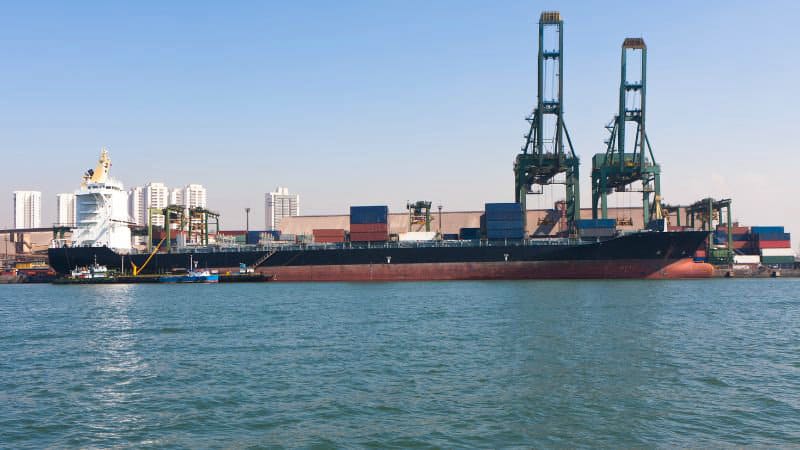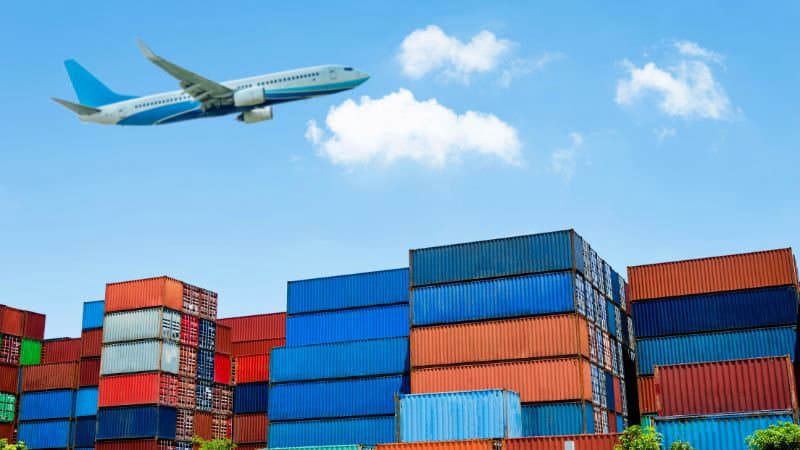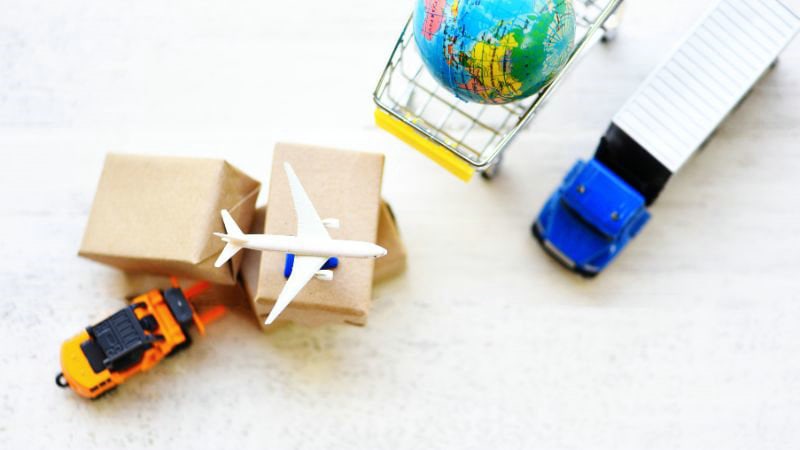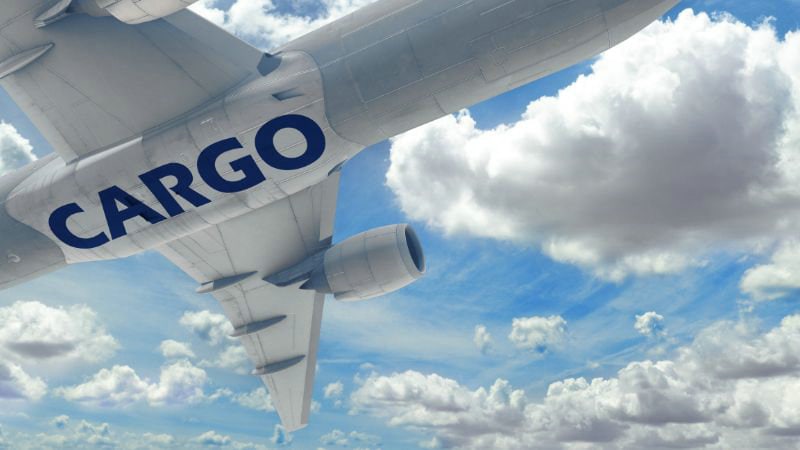When shipping from China to Brazil, you’re looking at a journey that’s not only vast in distance but intricate in logistics.
Major ports in both countries serve as hubs for international trade. Understanding the key terms and logistics can make your shipping process smoother.

Key Shipping Terms Explained
- FCL (Full Container Load): FCL means you rent an entire container, which can be 20ft or 40ft, providing you with a flat rate and space to transport large, heavy loads.
- LCL (Less than Container Load): When your cargo doesn’t fill an entire container, you pay only for the space you use, which is combined with other shipments in a process called consolidation.
Average Transit Time: Estimated 20 to 40 days by sea, varying on service route and sailing schedule.
Customs Wait Time: An average of 5.5 days in Brazil.
Methodologies of Shipping
When considering shipping containers from China to Brazil, you typically have two primary ways to ship at your disposal: sea freight and air freight.
Each has its unique advantages and suitability depending on your shipping needs.
Advantages of Sea Freight From China to Brazil
Sea freight is often your go-to option for larger shipments due to its cost-effectiveness, especially for FCL (full container load) but also for LCL (less than container load), where you share container space with others. Here’s why you might lean towards ocean shipping:
- Cost-Effective: Typically, sea freight offers lower costs compared to air freight, especially for bulk and heavy items.
- High Capacity: Shipping containers can accommodate large quantities and oversized cargo, making sea freight suitable for a wide range of goods.
- Environmental Impact: Generally, ocean shipping has a lower carbon footprint relative to air cargo transportation.
When to Choose Air Freight From China to Brizal
For time-sensitive shipments, air freight might be more appropriate. It’s the fastest way to transport goods internationally. Here are a few specific scenarios where air freight should be considered:
- Urgency: If you need your goods delivered within a tight timeframe, air freight can deliver them within approximately 5-7 days.
- High-Value Goods: Air freight offers enhanced security, which is beneficial for valuable items.
- Perishable Goods: For shipments that are time-sensitive or perishable, air cargo transportation ensures rapid delivery to maintain quality.
| When to Use Air Freight | Details |
|---|---|
| Speed | Delivery times are significantly shorter than ocean freight. |
| Security | Enhanced security for valuable cargo. |
| Perishability | Ideal for goods that require quick transit. |
Door to Door Shipping From China to Brazil
Door-to-door shipping involves the freight forwarder handling the cargo from the shipper’s premises in China all the way to the consignee’s location in Brazil without the need for the customer to coordinate with multiple logistics providers.
The transit time for sea freight shipments is usually 26-40 days from China to final delivery in Brazil, depending on specific origin/destination and sailing routes. Air freight transits in 3-7 days typically.
With door-to-door service, shipments can be delivered to inland Brazilian cities like Sao Paulo, Brasília, Curitiba, Campinas, Belo Horizonte etc. The freight forwarder arranges onward transport from Brazilian ports like Santos, Paranaguá, Rio Grande, etc.
Door-to-door cargo shipping is usually more expensive than ocean container shipping and air shipping. However, it has outstanding benefits, which include convenience for the customer, the ability to transport large/heavy cargo, specialized handling of dangerous/temperature-sensitive goods, and end-to-end visibility and control for the importer.
Luckystar Logistic, with extensive networks in both China and Brazil, offer competitive pricing and integrated door-to-door solutions on trade lanes between the two countries. If you are considering door to door shipment from China to Brazil, please contact us.
Customs and Documentation
When shipping from China to Brazil, customs clearance and having the proper documentation are critical to a successful delivery. Your attention to these details will ensure your goods move swiftly through customs, avoiding costly delays.
Navigating Customs Clearance
Brazil’s customs procedures are stringent, and proper registration with Brazilian authorities is crucial for both you and your freight forwarder.
You must work with a capable and proven customs broker who has expertise in the Brazilian market.
It’s not enough just to submit documents; they must be precise and complete to facilitate smooth customs clearance. Even minor errors or omissions can cause delays, so attention to detail is paramount.
Required Shipping Documents
Here is a list of key documents you’ll need for shipping to Brazil:
- Commercial Invoice: This official document should detail the value, quantity, and nature of your goods.
- Packing List: Provides comprehensive information about your cargo, including weight and packaging details.
- Bill of Lading or Air Waybill: This serves as a contract between the owner of the goods and the carrier. For air freight, it’s an Air Waybill, and for ocean freight, it’s a Bill of Lading.
- Certificate of Origin: This confirms where your goods were manufactured and may be required for customs or tariff purposes.
Ensure these documents are thoroughly reviewed and aligned with the cargo you’re shipping. They serve as a trail of your shipment’s journey for customs officials, helping them verify and process your goods quickly.
Cargo Types and Handling

When shipping from China to Brazil, it’s essential to consider the types of goods you’re transporting and the special handling they might require. This ensures their safe and efficient arrival.
Prohibited & Restricted Items
Some key prohibited items include:
- Narcotics and illegal drugs
- Merchandise that threatens morals, good customs, health, or public order
- Cigarettes or alcoholic beverages produced by Brazilian companies, except those destined only for foreign markets
Some key restricted items that require special approval or licenses to import include:
- Used consumer goods
- Fresh or frozen poultry and poultry products
- Fresh or frozen and further processed pork products
- Products that the Brazilian regulatory agencies consider harmful to health, sanitation, national security interests, and the environment
- Certain commodities related to the processing trade, as outlined in Brazil’s Catalogue of Commodities, are Restricted or Prohibited from Importing for Use in the Processing Trade
- Agricultural products or textiles may have specific restrictions
It’s important for shippers to consult with freight forwarders to get up-to-date information on Brazil’s prohibited and restricted items list. The regulations are subject to change over time. Thoroughly vetting items before shipping can prevent shipment delays, penalties, or confiscation by Brazilian customs authorities.
Here is the checklist:
- Alcoholic beverages
- Animal products
- Animal skins
- Antique
- Artwork (fine)
- Checks, canceled
- Chemicals, Haz and Non-Hazardous
- Computer software
- Diplomatic mail
- Drugs, Prescription and Non-Prescription
- Grain samples
- Jewelry, costume
- Labels
- Medical/dental supplies & equipment
- Money orders
- Perishables
- Porcelains
- Ship spares
- Soil
- Televisions, television equipment
- Tobacco
Special Considerations for Various Commodities
Your cargo might range from perishable goods like food and beverages to pharmaceuticals and advanced electronic components.
Perishable items often necessitate reefer containers to control temperature, while pharmaceuticals require secure and sometimes temperature-controlled environments to maintain their integrity.
If you’re shipping electrical equipment or plastic gear products, proper packing and cushioning are critical to protect against damage.
For commodities like aluminum and other bulk materials, shipping in quantities that merit less than container loads (LCL) might be more cost-effective.
Conversely, heavy and sizeable items such as machinery, heavy machinery, and food processing equipment could need full container loads (FCL) or specialized equipment like flat racks for accommodation.
Handling Oversized and Hazardous Cargo

Transporting oversized equipment such as lathes or medical equipment requires a detailed logistics plan.
You’ll need to secure open top containers or flat racks for these loads, and in some cases, arrange for overhead lifting by crane.
Hazardous cargo, including certain chemicals and gas, must be handled following strict international regulations, which may involve obtaining special permits and packaging in hazard-proof containers.
For heavy loads and vehicles, roll-on/roll-off (RoRo) shipping methods may be used, while air freight could be the choice for time-critical freight like medical supplies or humanitarian relief aid.
Regardless of the type, sensitive cargo demands careful monitoring throughout the shipping process, ensuring that your goods arrive intact and functioning as expected.
Main Air and Sea Ports in Brazil and China
Main airports in Brazil
| Airport | Introduction |
| São Paulo Guarulhos International Airport (GRU) | GRU is Brazil’s largest and busiest airport, serving the São Paulo metropolitan area. With nearly 42 million passengers in 2019, it is a major hub for many Brazilian airlines and a gateway linking Brazil to destinations across the Americas, Europe, Africa, and Asia. |
| Rio de Janeiro Galeão International Airport (GIG) | Located on Governador Island in Rio de Janeiro, Galeão Airport serves over 22 million passengers annually. It is Rio’s main long-haul international airport with flights to Europe, North America, Africa and the Middle East. |
| Rio de Janeiro Santos Dumont Airport (SDU) | SDU serves as Rio de Janeiro’s main airport for domestic flights, located close to the city center. It handled nearly 7 million passengers in 2019. The architecturally modern airport plays a key role in connecting Rio with other key destinations across Brazil. |
| Brasília International Airport (BSB) | BSB is the major airport serving Brazil’s capital, Brasília, and surrounding regions in the country’s Center-West. With about 10 million passengers annually, it links Brasília to most of Brazil’s largest cities through domestic flights |
| Deputy Luís Eduardo Magalhães International Airport (SSA) | Located in Salvador, this airport serves Brazil’s Northeast region. It handles over 10 million passengers annually and offers flights across Brazil and to select international destinations. The other airports also play important roles in Brazil’s air transportation network, linking key cities and states to the rest of the country. |
Main airports in China
| Airport | Introduction |
| Beijing Capital International Airport (PEK) | Located in Beijing, it is China’s busiest airport and main international aviation hub, with flights to over 230 destinations. It served over 100 million passengers in 2019 across its three terminals. PEK links China to major cities globally. |
| Shanghai Pudong International Airport (PVG) | Located in Shanghai, it is one of China’s largest airports, serving over 80 million passengers in 2019. With two terminals, it offers flights to about 210 destinations, including key cities in China, Asia, Europe, and North America. |
| Guangzhou Baiyun International Airport (CAN) | Located in Guangzhou, this airport serves as the main hub for China Southern Airlines. With two terminals, it handled over 70 million passengers in 2019 and offers flights to more than 220 destinations around the world. |
Main Seaports in China and Brazil
| Country | Port | Key Facts |
|---|---|---|
| China | Port of Shanghai | – World’s largest container port – Handled over 40 million TEUs in 2019 |
| China | Port of Shenzhen | – One of the world’s busiest container ports – Handled over 25 million TEUs in 2019 |
| China | Port of Ningbo-Zhoushan | – World’s largest port by cargo tonnage at 1 billion+ tons annually |
| China | Port of Qingdao | – Major port in eastern China – Handled over 18 million TEUs in 2019 |
| Brazil | Port of Santos | – Largest and busiest container port in Latin America – Almost 3 million TEUs handled |
| Brazil | Port of Paranaguá | – Major public port focused on bulk exports – Over 50 million tons handled annually |
| Brazil | Port of Rio Grande | – Large public port focused on exports – Key port for regional trade |
| Brazil | Port of Itaguaí | – Exports many industrial goods and steel products |
Popular Routes When Shipping Goods From China to Brazil
| Route Type | Origin City | Destination City | Transit Time | Major Carriers |
|---|---|---|---|---|
| Ocean Freight | Shekou, China | Rio de Janeiro, Brazil | 26-30 days | CMA CGM, Evergreen, COSCO |
| Ocean Freight | Shanghai, China | Santos, Brazil | 30 days | CMA CGM, Evergreen, MSC, COSCO, Hapag-Lloyd |
| Air Freight | Wuhan, China | São Paulo, Brazil | 1 day 2 hours | Ethiopian Airlines |
| Air Freight | Beijing, China | São Paulo, Brazil | 1 day | EgyptAir, Emirates, Air France |
Shipping Time From China to Brazil

- Air Freight:
For urgent shipments, air freight ship takes typically between 3 to 7 days. - Sea Freight:
A more cost-effective method for larger shipments, sea freight has longer transit times.
Expect approximately 35-45 days for your goods to be transported via ocean carriers.
Transit times will vary based on the specific route taken and can be influenced by external factors such as weather and port congestion, so it is wise to plan accordingly for any variability.
Factors Influencing Transit Time:
- Chinese Holidays: Delays often occur during holidays such as the Chinese New Year, Golden Week, and the Dragon Boat Festival.
- Peak Seasons: Be mindful that during peak shipping times, like before the Chinese New Year, rates can increase and schedules might be tighter.
- Regular Updates: Stay updated with your freight forwarder’s schedule changes, which might affect your planned shipping date.
Air Freight Shipping Time
| Guangzhou | Shenzhen | Yiwu | Shanghai | Beijing | Ningbo | |
|---|---|---|---|---|---|---|
| Sao Paulo Guarulhos International Airport | 1-3 days | 1-3 days | 1-3 days | 1-3 days | 1-3 days | 1-3 days |
| Rio De Janeiro Galeao Airport | 2-3 days | 2-3 days | 2-3 days | 2-3 days | 2-3 days | 2-3 days |
| Brasilia International Airport | 1-3 days | 1-3 days | 1-3 days | 1-3 days | 1-3 days | 1-3 days |
| Deputado Luís Eduardo Magalhães International Airport | 3-4 days | 3-4 days | 3-4 days | 3-4 days | 3-4 days | 3-4 days |
| Afonso Pena International Airport | 1-3 days | 1-3 days | 3-4 days | 3-4 days | 3-4 days | 3-4 days |
| Augusto Severo International Airport | 1-3 days | 1-3 days | 1-3 days | 1-3 days | 1-3 days | 1-3 days |
Sea Freight Shipping Time
| Route | Estimated Transit Time |
|---|---|
| Port of Shanghai-Port of Santos | 30 – 40 days |
| Port of Ningbo-Port of Rio de Janeiro | 32 – 40 days |
| Port of Guangzhou-Port of Paranaguá | 35 – 43 days |
| Port of Shenzhen-Port of Salvador | 33 – 43 days |
| Port of Qingdao-Port of Rio Grande | 30 – 410days |
| Port of Tianjin-Port of Itajaí | 34 – 43 days |
Shipping Cost From China to Brazil

When you want to import from China to Brazil, understanding the complexities of shipping costs and ensuring your cargo may be the thing you are concerned about the most. Because these elements directly impact your sales and the safety of your commercial products during transit.
Air freight rates from China to Brazil
Cost of Shipping by Air
| Volume | Route | Price Per KG ($USD) |
|---|---|---|
| Rate for 100KGS-299KGS | Shanghai-Guarulhos (GRU) | 6 |
| Rate for 100KGS-299KGS | Shanghai-Sao Paulo (VCP) | 6.5 |
| Rate for 100KGS-299KGS | Beijing – São Paulo | 8 |
| Rate for 100KGS-299KGS | Beijing – Rio de Janeiro | 8 |
| Rate for 100KGS-299KGS | Beijing – Brasília | 8 |
| Rate for 100KGS-299KGS | Guangzhou-Guarulhos (GRU) | 8.5 |
| Rate for 300KGS-1000KGS | Shanghai-Guarulhos (GRU) | 6.9 |
| Rate for 300KGS-1000KGS | Shanghai-Sao Paulo (VCP) | 7.5 |
| Rate for 300KGS-1000KGS | Guangzhou-Guarulhos (GRU) | 8.5 |
| Rate for 1000KGS+ | Shanghai-Guarulhos (GRU) | 6.8 |
| Rate for 1000KGS+ | Shanghai-Sao Paulo (VCP) | 7.5 |
| Rate for 1000KGS+ | Guangzhou-Guarulhos (GRU) | 8.1 |
Sea freight rates from China to Brazil: LCL Shipping and FCL Shipping
Cost of Sea Shipping (LCL)
| Route | USD/CBM (1-3 CBM) | USD/CBM (3-9 CBM) |
|---|---|---|
| Ningbo-Santos | 18 | 18 |
| Ningbo-Navegantes | 55 | 78 |
| Ningbo-Paranagua | 55 | 78 |
| Shanghai-Santos | 9 | 18 |
| Shanghai-Navegantes | 68 | 79 |
| Shanghai-Paranagua | 68 | 78 |
| Shenzhen-Santos | 39 | 40 |
| Shenzhen-Navegantes | 37 | 26 |
| Shenzhen-Paranagua | 39 | 24 |
Cost of Sea Shipping (FCL)
| Route | Container 20’ (USD) | Container 40’ (USD) |
|---|---|---|
| Shanghai-Santos | 2880 | 3100 |
| Shanghai-Navegantes | 2880 | 3100 |
| Shanghai-Paranagua | 2880 | 3100 |
| Shenzhen-Santos | 3200 | 3300 |
| Shenzhen-Navegantes | 3200 | 3300 |
| Shenzhen-Paranagua | 3200 | 3300 |
| Ningbo-Santos | 3000 | 3100 |
| Ningbo-Navegantes | 3000 | 3100 |
| Ningbo-Paranagua | 3000 | 3100 |
Door to Door Shipping Cost From China to Brazil
| Route | Estimated Cost (USD) |
|---|---|
| Shanghai-São Paulo | $3,000 – $5,000 |
| Guangzhou-Rio de Janeiro | $3,100 – $5,000 |
| Beijing-Brasília | $3,200 – $5,000 |
| Shenzhen-Belo Horizonte | $3,150 – $5,000 |
| Ningbo-Salvador | $3,050 – $5,000 |
*Please note that the rates shown are only estimates to provide an indication of pricing. Actual quotes will vary depending on the specific details of the shipment, such as the goods, weight, dimensions, delivery timeline, and other requirements.
We work with each customer individually to develop customized shipping solutions tailored to your needs and budget. You can expect competitive pricing that aims to deliver great value.
Please contact us to discuss your shipping needs – Luckystar looks forward to putting together an unexpected price for you. We will offer you the cheapest way to ship your goods, we are your most trustworthy shipping company.
Tax and Fees
Key taxes and duties that are levied on shipping cargo from China to Brazil:
- Import Duty (II): A federal tax levied on the CIF (cost, insurance, and freight) value of imported goods. Rates generally range from 10-35%.
- Industrialized Product Tax (IPI): A federal value-added tax applied on most imported and domestically manufactured goods. Rates range from 0-15%, and the taxable base is the CIF value plus import duties.
- ICMS Tax: A state value-added tax levied on the CIF value plus import duties and IPI. The rate varies by state but is generally around 17-19%.
- PIS and COFINS Taxes: Federal social contribution taxes are applied on imports. The combined rate is generally 11.75% but can be higher for some products.
- Other minor taxes and fees may also apply like a Merchant Marine Renewal Tax and customs fees.
Choosing the Right Freight Forwarder

Selecting the right China freight forwarder is vital for a seamless import process. There are three aspects you should consider when you choose your freight forward:
- Experience: Working with a freight forwarder well-versed in China-Brazil shipments to navigate customs and logistics efficiently.
- Services: Whether you need door-to-door, port-to-port, or a custom service, your freight forwarder should cater to your specific needs.
- Network: A robust network ensures your cargo moves smoothly and on time.
Always check the freight forwarder’s credentials and customer reviews to secure a reliable partner in your shipping process.
Why Choose Us? Luckystar Logistic
Established in 2022, Luckystar is an esteemed member of the Federal Maritime Commission (FMC) and operates as a Non-Vessel Operating Common Carrier (NVOCC). Our mission is to deliver superior service quality at reduced costs, primarily serving China, the USA, Canada, and Europe. With core team members boasting over 20 years of experience in logistics, Luckystar brings considerable expertise to the table. Since its inception, the company has been dedicated to offering global door-to-door transport and logistics solutions, emphasizing dependability, adaptability, and responsiveness.
We’re not just a company; we are experts in transportation! Offering industry-leading solutions, we take pride in providing premium shipping services at a fraction of the cost of other freight forwarders, both in China and across the globe. Here’s why partnering with us is the smart move:
Accuracy You Can Count On:
Say goodbye to delivery delays and hello to timely delivery, which is vital for businesses needing to deliver goods swiftly to their customers.
Your Passport to Global Reach:
Our wide network of delivery destinations virtually covers the entire globe, offering extraordinary opportunities for businesses aiming to expand their reach. You can be assured that your package will find its way to almost any corner of the world, taking your business global!
Track with Ease:
Say goodbye to guesswork. Our stringent procedures afford you a live tracking mechanism, making it easy for you to follow your shipment’s progress at every stage of its journey. Stay informed and enjoy peace of mind, knowing exactly where your shipment is anytime you need to know.
Personalized Service, Every Step of the Way:
One of our dedicated team members will personally oversee your shipment from start to finish. This, coupled with our commitment to transparency and constant communication, ensures you are kept updated on the progress of your cargo every step of the way.
When shipping hazardous materials, it’s crucial to work with experienced service providers to ensure that your shipment is handled safely and efficiently. By partnering with us, you can have peace of mind knowing that your shipment is in good hands.
Are you looking for an experienced freight forwarder to assist you in shipping? Contact us. We’re always ready to help. Offering the unbeatable cheapest shipping rates for international shipping, our services are more affordable than you’d believe. Don’t hesitate! Get in touch with us today and get your best shipping solution service from China to Brazil.
